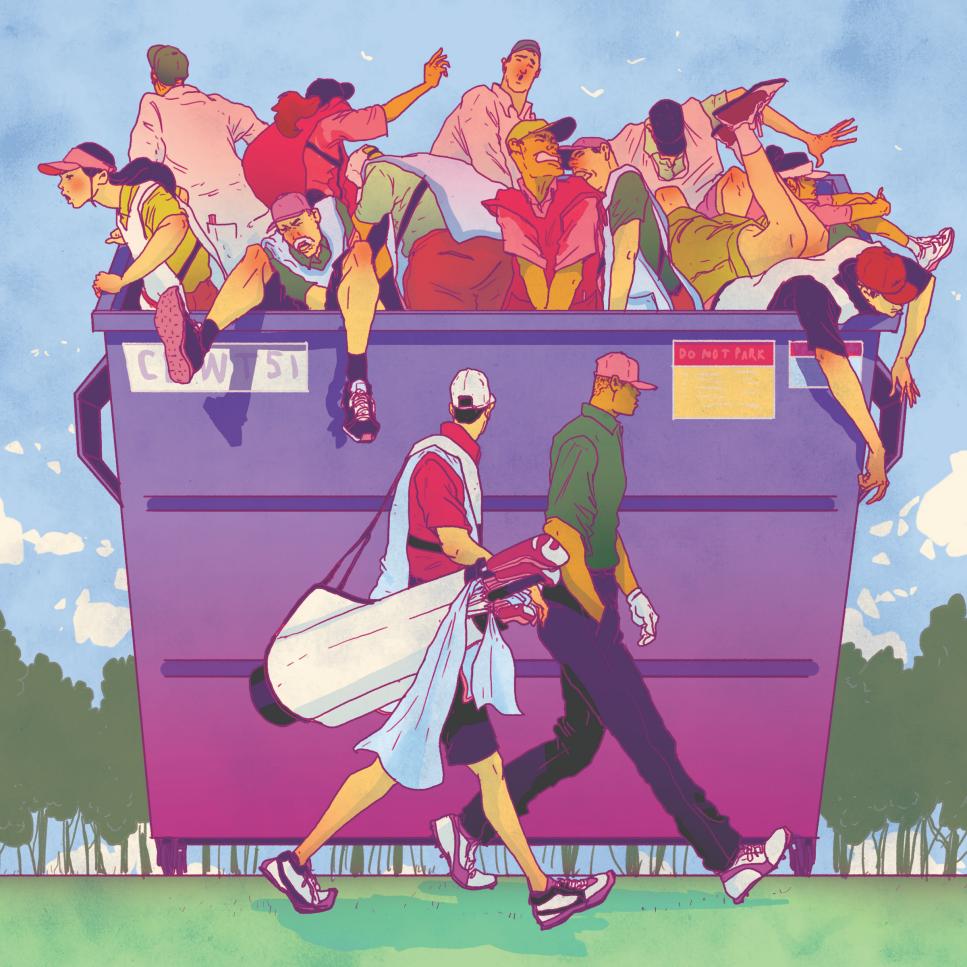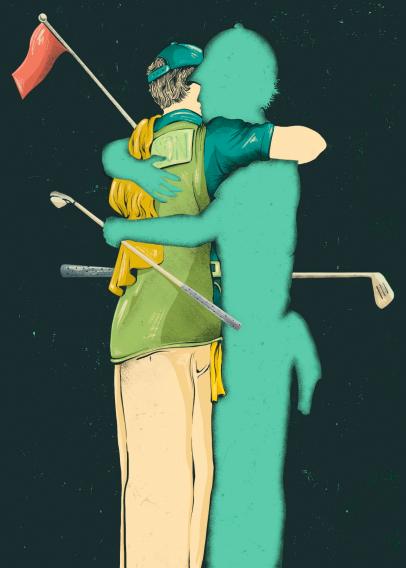Life on the Bag
Undercover Caddie: Why do we accept jobs from players with commitment issues?

Illustration by Michael Byers
Maybe your boss is a jerk. Perhaps you’re working in a temporary job or you’re not happy with what you do, but nothing better is on the horizon, and you have bills to pay, right?
Now you know why we work with caddie killers—players who hire and fire so many loopers you wonder where they all go. They’re actually not the monsters that name conveys. When fans think of caddie killers, they think of the players with short tempers who lose it on their caddies or the high-profile break-ups of a caddie leaving his player mid-round. Those dustups are dramatic and make for good headlines, and yes, the players involved are usually branded for life as beefheads, but the truth is that this is a normal aspect of our profession, and the normal is usually mundane.
I’ve had two experiences with caddie killers. The first was when I was starting out. I had a couple of good runs, but they were all fill-ins or trials. I was looking for something more permanent. An agent called me up, saying his player—a younger guy who after being with one caddie for three years had gone through four caddies in the past 15 months—had been impressed with me and wanted to know if I’d take on his bag. We played a lot that autumn, logging five starts, and did well: He had his first top-10 in months and two other top-25s, and he never missed a cut. Seemed like after a couple iffy seasons this guy was getting back on track. A week before Thanksgiving I got a message from the player saying he really enjoyed our time and thinks we make a good team, but his old college teammate wants to give caddieing a try, and he feels indebted to the guy, so he no longer would need my services. I was a bit sore; anyone is after losing a job, especially when you did that job well. But you know what? I don’t blame him. He was trying to be a good friend, and more importantly to him he had his confidence back. That friend didn’t make it to the summer before getting canned. The player went through another round of caddies and eventually lost his card.
My other experience was working for a player the fans love who had a reputation among caddies as a petulant child and had gone through two caddies in a short time before offering me a job. I found him to be a gentleman and one of the funniest guys I’d worked for. We missed the first cut. He almost won in our second week, then made two cuts but with distant finishes. In our fifth event he started out well but pulled out on Friday with a wrist injury. On Sunday morning his manager called and said the relationship was over. However, before I had the chance to get upset, that manager said he had a college kid turning pro in a month and asked if I’d like to try out for that. Though that job was temporary, it led me to another job in the manager’s stable, and I’ve been with this current player for, heck, I’ve lost count of the years.
Yes, it was weird, and anytime you move on, people ask what happened. Honestly, nothing happened. It just happened.
Fans see these relationships like Spieth and Greller and think that’s how it is. Theirs is the aberration. Theirs is a marriage. As I try to tell the caddies who are just starting, if you’re looking for marriage, you’re going to get stomped. Think of these like flings. Maybe it will work out. It probably won’t. Some flings will last a week, some for years, but there is going to be an end. Try to have fun and if something more lasting happens, congrats.
Admittedly I have a more positive outlook on this thing. Some guys won’t touch players with this stigma. But the way I see it, if a player has a reputation for riding caddies hard and cutting them at the first sign of trouble or for no reason at all . . . well, to develop a reputation means he must have been out here long enough to earn that rep, and that means he’s a damn good player. You’ve seen what tour players make nowadays. Even if it’s going to be a short ride, it’s a ride that can still be profitable.
As for why we sign up for jobs that we know we’ll likely lose, well, the reasons vary. It’s hard to break into this industry and even tougher to stay in it. If there’s an open bag, it doesn’t matter the hardships that could come with it. We have to make a living. Or maybe you do it to get yourself on the radar of agents or other players, so when another job comes available, they think of you. Honestly, deep down, we also believe that we can be difference-makers, that we’re the ones that will be different. Caddies are humble, yet each of us still has a bit of hubris. If you don’t have that type of confidence, you shouldn’t be out here. —With Joel Beall




